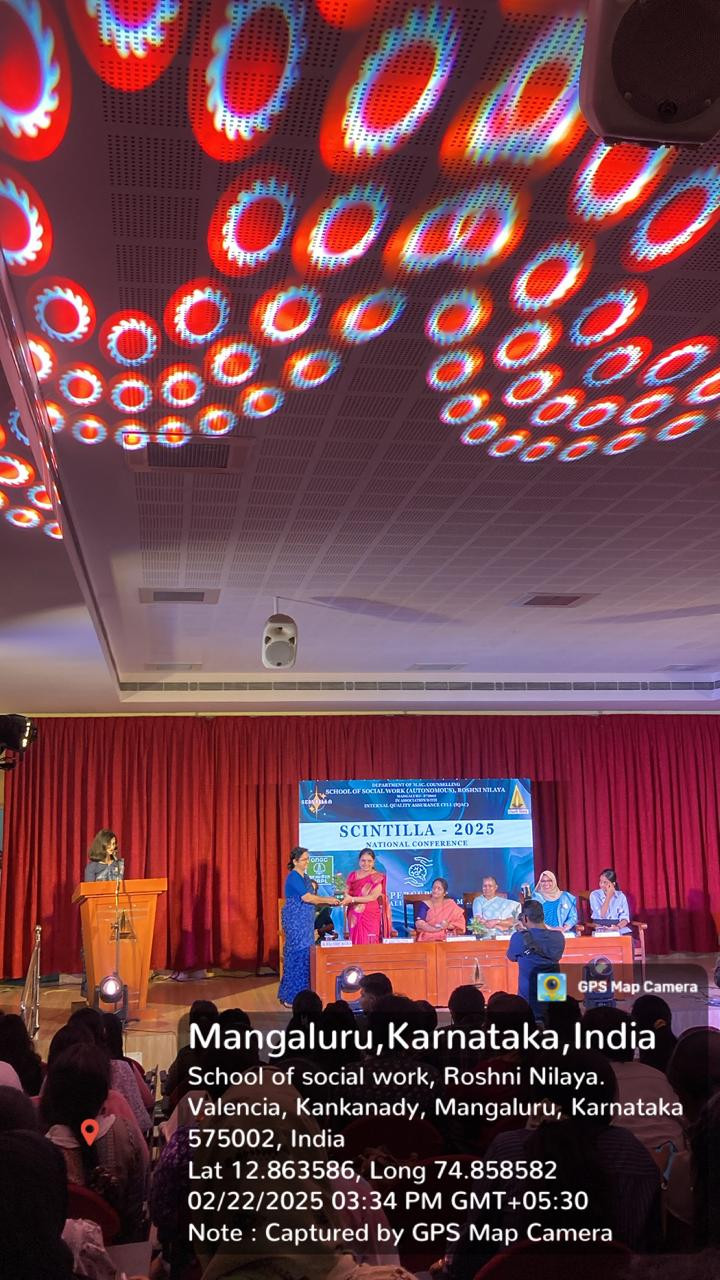Mangaluru: The two-day National Conference, Scintilla 2025: Perceptio – Crafting Reality with the Mind’s Eye, hosted by the Postgraduate Department of Counselling, School of Social Work, Roshni Nilaya, in collaboration with Mangalore Refinery and Petrochemicals Limited (MRPL) concluded successfully on February 22, Saturday. The conference witnessed participants from 18 colleges across India.
The second day featured engaging sessions, including “Unlocking the Secret of Mentalism – Myth Busting and Reality Checking”, conducted by renowned magician and mentalist Dr. B.S. Rakesh. He captivated the audience with an enlightening session infused with magic tricks, demonstrating the psychological principles behind illusions and perception. The session also highlighted the role of language, communication, belief systems, and cognition.
Following this, the conference hosted “From Victim to Survivor: The Transformative Power of Perception”, an inspiring talk by Dr. Lavina Noronha, Director of Ave Maria Palliative Care Centre and founding trustee of the Shusheg Suicide Helpline. She shared insights on resilience and shifting mindsets in crisis situations, emphasizing the importance of shedding disempowering labels that render individuals helpless.
The valedictory ceremony marked the grand conclusion of the conference. Chief Guest Dr. Deepa Maria Rasquina delivered an address,speaking about the significance of networking, the art of Kaizan, and always changing to improve and enhance our understanding of the world and self. Professor Evelyn Benis delivered the presidential address and spoke about the importance of sharing and communal concern, and took home the valuable lessons that nature impart, which is that of a generous spirit and serenity.
IQAC Coordinator Dr. Saritha D’Souza, Chief Guest Dr. Deepa Maria Rasquina, Secretary of Social Services Professor Evelyn Benis, Organizing Secretary Ms. Thani Anwar, Dr. Rosa Nimmy Mathew, H.O.D, M.Sc Counselling, Student Cultural Secretary Mitra S comprised of the valedictory delegation.
Ms. Ifra Ayesha compered the event. Assistant Professor Dr. Wilsy Francis, Ms Akshaya Bhandary, and Associate Professor Cecilia F. Goveas, were present among others.



Let the Truth be known. If you read VB and like VB, please be a VB Supporter and Help us deliver the Truth to one and all.
Bengaluru (PTI): A 34-year-old mechanic has died after falling off a scooter on his way to a referral hospital, as the medical facility that diagnosed him to have suffered a heart attack did not provide necessary first aid, the family of the deceased claimed.
A CCTV video showing his injured wife pleading with passersby for help while her husband Venkataramanan lay on the road after falling from the two-wheeler on December 13 has gone viral recently.
According to the family, Venkataramanan complained of chest pain, and his wife Roopa rushed him on their scooter from their home in Balaji Nagar around 3.30 am to a private hospital where treatment was denied, citing the non-availability of a doctor, the family said.
Then, she took him to another hospital where ECG was done, which showed him to have suffered a heart attack. However they immediately referred him to the Jayadeva Institute of Cardiovascular Sciences. The family alleged that no basic treatment was provided there. On the way to Jayadeva hospital, Venkataramanan allegedly suffered chest pain again and the couple fell off the scooter, the family said.
In the CCTV video, injured Roopa can be seen pleading with passersby to help her husband reach the hospital, but no one responded until a cab driver stopped to check on them. With his help, she reached Jayadeva hospital, where doctors declared Venkataramanan brought dead, the family said. His family later donated his eyes.





